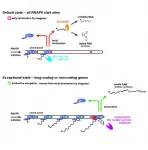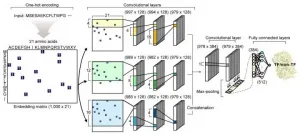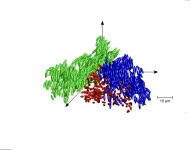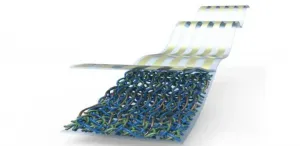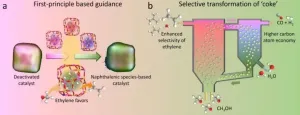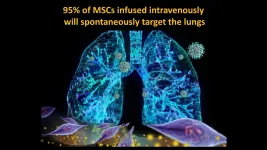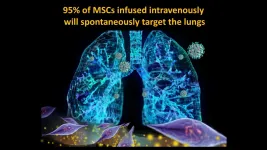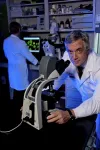Looking forwards rather than backwards safeguards wellbeing during Covid-19 lockdowns
2021-01-05
(Press-News.org) Practicing gratitude and looking to the future will help safeguard our mental wellbeing during Covid-19 lockdowns, a new study in the Journal of Positive Psychology reports.
In the first study of its kind, researchers from the University of Surrey investigated the effectiveness of three psychological interventions -- nostalgia, a sentimentality for the past; gratitude, recognising the good things currently in our life; and best possible self, thinking about positive elements of the future -- and how they each affect wellbeing during lockdowns.
Personal characteristics such as emotion regulation (the ability to respond to and manage an emotional experience) and attachment orientations (how a person views their relationships to others) were also examined. It is believed that such traits may be an indicator of how an individual responds to lockdowns.
Investigating which intervention was the most effective, researchers worked with 216 participants who were each assigned to one of four groups, each one practicing either nostalgia, gratitude or best possible self, plus a control group.
Those practicing a nostalgic approach were instructed to think of a sentimental memory in their life that occurred before the lockdown; for gratitude, participants were encouraged to list three things that went well in their day and why this was; and for best possible self those involved were asked to think about where they imagine themselves in the future after lockdown has lifted. Those in the control group were each asked to recall the plot of a recent television or film they had viewed. Participants were then asked about their thoughts and feelings.
Researchers found that those who participated in the best possible self and gratitude interventions reported higher levels of social connectedness than those who practiced nostalgia. Those in the best possible self group were also found to experience significantly more positive emotion than those in the nostalgia group. Researchers believe that gratitude and best possible self direct attention towards positive aspects of a person's life by giving them hope and prevent individuals from dwelling on their current situation.
Amelia Dennis, a postgraduate researcher at the University of Surrey, said: "All three interventions have proven beneficial to people experiencing a difficult time in their life. However, as lockdowns have continued people have been presented with unusual challenges and many have struggled. We found that looking to the future and appreciating what is positive in our lives currently is more psychologically beneficial than reminiscing about the past.
"The current restrictions and any future lockdowns have removed our sense of control of our lives. For the sake of our wellbeing, we need to acknowledge what we do have rather than regretting what we have lost."
Participants were also surveyed on their personal characteristics regarding attachment and emotion regulation. Researchers found that those with low attachment anxiety (i.e. believe they are worthy of love) and those with lower attachment avoidance (i.e. inclined to feel others are trustworthy) were most likely to experience greater wellbeing during lockdown. Those with higher emotion regulation were also found to be more resilient to their current circumstances, which protects their overall wellbeing.
Jane Ogden, Professor of Health Psychology at the University of Surrey, said: "The two lockdowns last year dramatically affected our mental and emotional wellbeing and it is likely any future ones will have the same affect. Reports of increased levels of depression and anxiety are worrying because these can negatively impact upon our physical health. It is important that we understand which psychological techniques can most benefit and support people during unsettling and difficult times."
INFORMATION:
ELSE PRESS RELEASES FROM THIS DATE:
2021-01-05
In a joint collaboration, Danish and German researchers have characterized a cellular activity that protects our cells from potentially toxic by-products of gene expression. This activity is central for the ability of multicellular organisms to uphold a robust evolutionary 'reservoir' of gene products.
Manufacturing processes need quality control systems in order to ensure proper assembly of functional products. Moreover, space-consuming, and perhaps even toxic, by-products of such processes need to be properly discarded or recycled by efficient waste handling systems.
By analogy, transcription of our genome is an imperfect process that produces large quantities of non-functional and potentially harmful transcripts both from within and ...
2021-01-05
Researchers at the Francis Crick Institute and the University of Western Australia have developed a new imaging method to see where antibiotics have reached bacteria within tissues. The method could be used to help develop more effective antibiotic treatments, reducing the risk of antibiotic resistance.
During bacterial infections like tuberculosis, bacteria enter human cells, which poses a challenge for treatment, as antibiotics must reach and enter all infected cells in order to be effective. If researchers could select for or develop more effective antibiotics based on where they reach, this may reduce the length of treatment ...
2021-01-05
A joint research team from KAIST and UCSD has developed a deep neural network named DeepTFactor that predicts transcription factors from protein sequences. DeepTFactor will serve as a useful tool for understanding the regulatory systems of organisms, accelerating the use of deep learning for solving biological problems.
A transcription factor is a protein that specifically binds to DNA sequences to control the transcription initiation. Analyzing transcriptional regulation enables the understanding of how organisms control gene expression in response to genetic or environmental changes. In this regard, finding the transcription factor of an organism is the first step in the analysis ...
2021-01-05
While glass is a truly ubiquitous material that we use on a daily basis, it also represents a major scientific conundrum. Contrary to what one might expect, the true nature of glass remains something of a mystery, with scientific inquiry into its chemical and physical properties still underway. In chemistry and physics, the term glass itself is a mutable concept: It includes the substance we know as window glass, but it may also refer to a range of other materials with properties that can be explained by reference to glass-like behaviour, including, for instance, ...
2021-01-05
Sunlight offers a potential solution in the search for an energy source that does not harm the planet, but this depends on finding a way to efficiently turn electromagnetic energy into electricity. Researchers from KAUST have shown how a known herbicide can improve this conversion in organic devices.
While solar cells have traditionally been made from inorganic materials such as silicon, organic materials are starting to break through as an alternative because they are light, flexible and relatively inexpensive to make, even offering the possibility for ...
2021-01-05
MTO process, which was first commercialized in 2010, is a catalytic process converting methanol, which is typically made from coal, natural gas, biomass, and CO2, over SAPO-34 zeolite catalyst. It's becoming one of the main streams for producing light olefins, including ethylene and propylene, from non-oil resources.
One of the major challenges in MTO is the rapid deactivation of zeolite catalyst due to the coke deposition.
In industrial practices, a fluidized bed reactor-regenerator configuration is normally used in order to maintain the continuous operation, in ...
2021-01-05
Dr. Camilo Ricordi, director of the Diabetes Research Institute (DRI) and Cell Transplant Center at the University of Miami Miller School of Medicine, and his team of international collaborators are reporting the results of a groundbreaking randomized controlled trial showing umbilical cord-derived mesenchymal stem cell (UC-MSC) infusions safely reduce risk of death and quicken time to recovery for the most severe COVID-19 patients. Dr. Ricordi's peer-reviewed paper has just been published in STEM CELLS Translational Medicine (SCTM) January 2021.
The clinical trial, authorized by the FDA last ...
2021-01-05
Dr. Camilo Ricordi, director of the Diabetes Research Institute (DRI) and Cell Transplant Center at the University of Miami Miller School of Medicine, and his team of international collaborators are reporting the results of a groundbreaking randomized controlled trial showing umbilical cord-derived mesenchymal stem cell (UC-MSC) infusions safely reduce risk of death and quicken time to recovery for the most severe COVID-19 patients. Dr. Ricordi's peer-reviewed paper has just been published in STEM CELLS Translational Medicine (SCTM) January 2021.
The clinical trial, authorized by the FDA last April, was initiated by The Cure Alliance, a 501(c)(3) non-profit organization of research scientists founded ten years ago by Dr. Ricordi for scientists ...
2021-01-05
Like any other plant, Arabidopsis thaliana or mouse-ear cress, needs nitrogen to survive and thrive. But, like maize, beans and sugar beet, it prefers nitrogen in the form of nitrate, growing better on nitrate rich soil. Whereas, pine and rice for example preferentially grow on ammonium nutrition, another form of the key macronutrient nitrogen. If the concentration or the availability of the different forms of nitrogen fluctuate, plants have to adapt quickly. "One of the most important questions is, what is the role of plant hormones in adaptation to the nitrogen availability? How do the machineries within a plant cope with their changing environment?" asks Eva Benková, developmental biologist and Professor at the Institute of Science and Technology (IST) Austria.
Finding the balance
In ...
2021-01-05
University of Miami Miller School of Medicine researchers led a unique and groundbreaking randomized controlled trial showing umbilical cord derived mesenchymal stem cell infusions safely reduce risk of death and quicken time to recovery for the severest COVID-19 patients, according to results published in STEM CELLS Translational Medicine in January 2021.
The study's senior author, Camillo Ricordi, M.D., director of the Diabetes Research Institute (DRI) and Cell Transplant Center at the University of Miami Miller School of Medicine, said treating COVID-19 with mesenchymal stem cells makes sense.
Results: treatment group vs. ...
LAST 30 PRESS RELEASES:
[Press-News.org] Looking forwards rather than backwards safeguards wellbeing during Covid-19 lockdowns
